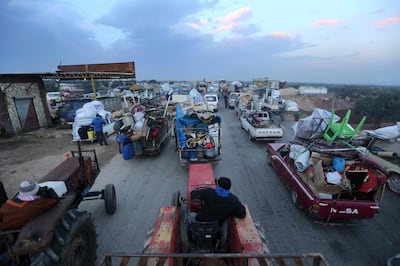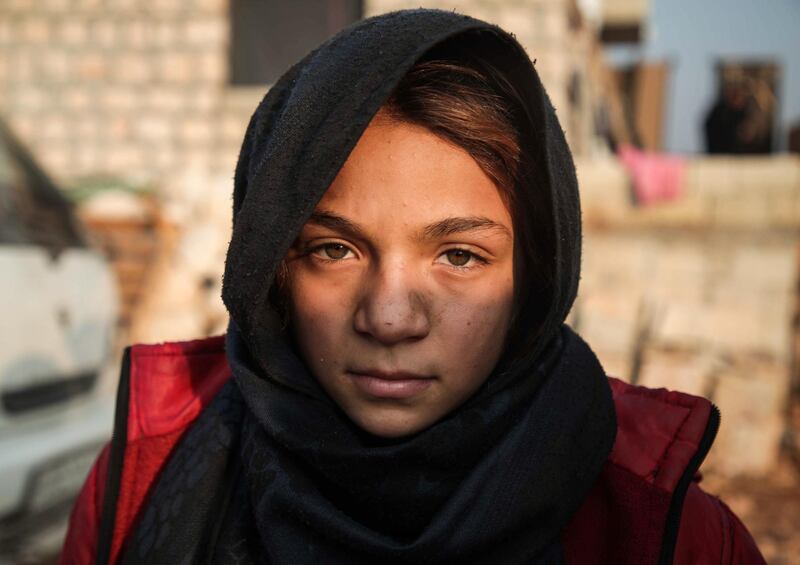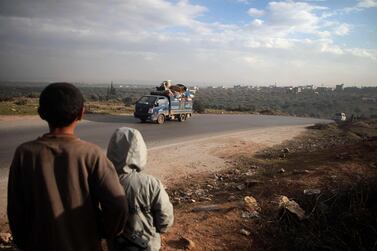For many people, the holidays are about family and home. Loved ones gathered over home-cooked meals, exuding warmth, their embrace offering a brief respite from the hardships of life.
In the diaspora, one yearns for home and seeks to recreate it in familiar rituals. A pot roast, perhaps. A midnight prayer maybe or a candle with a familiar scent. Eventually a past that can only be imitated with imperfection gives way to your own creation, your own rituals and traditions, your very own new home.
I was contemplating these ideas of home this week as further news emerged of the tragedy of Idlib, a province in northwestern Syria that is under renewed attack by the regime of Syrian President Bashar Al Assad and his allies, a final paroxysm of violence before the new year.
Idlib is one of the last remaining areas outside of Mr Al Assad’s control, as his forces have clawed back territory from rebels all over the country during the last three years. The province is controlled by rebel groups, the most powerful of which is Hayat Tahrir Al Sham, who are jihadists with links to Al Qaeda. But Idlib is also home to three million civilians, half of whom are so-called internally displaced people – basically refugees in their own country. Three quarters of them are women and children.
Mr Al Assad has repeatedly vowed to wrest back Idlib, which is on the border with Turkey. So the latest offensive, which began on December 16 despite a ceasefire negotiated by Ankara and Moscow being officially in place, comes as no surprise. It has been in the works for years. It will culminate in an orgy of violence and war crimes by Mr Al Assad and his allies, and hand-wringing by an international community now used to turning a blind eye to human rights abuses. Nothing will be done.

But one figure in the flurry of UN statistics over the past few days stopped me in my tracks. Throughout the month of December, around 284,000 people in Idlib province fled their homes, moving north towards the Turkish border. Maarat Al Numan, a historic town that withstood years of indiscriminate bombardment, has been largely emptied of its inhabitants.
In a single month, more than a quarter of a million people, around 80 per cent of whom were women and children, picked up what few belongings they had remaining or could carry away and left their homes in the dead of winter and under torrential rains, probably never to return, their homes and dreams crushed by the advancing war machine.
Some of Idlib’s displaced have already been forced to move twice, three times, some even ten times. Many of those living in the province moved there after Mr Al Assad’s forces took over other parts of the country, fearing disappearance and torture in the regime’s sadistic network of dungeons or being drafted into the military to battle their brethren.
But now they have nowhere left to run. The Turkish border is closed, with Ankara having decided that it was no longer politically feasible to accept more refugees. So Idlib’s refugees are trapped in an ever-shrinking plot of land, barred from flight. Even humanitarian relief is denied, because cross-border aid has been vetoed by Russia and China, but largely because human decency was also a casualty of nine years of war in Syria.
The plight of Idlib’s civilians exposes another phenomenon of the past decade – the inexorable rise of the anti-immigrant populists in Europe, the US and beyond. They lied to their citizens, warning them against the impending deluge of brown people who were coming for their jobs, who would transform their neighbourhoods and nation-states, impose foreign codes of behaviour, overthrow the established order and pollute their societies.
They lied because the overwhelming majority of those who sought refuge across border fences, who drowned in the Aegean and the Mediterranean, who endured the humiliations of the enlightened world’s xenophobes and racists, were just like Idlib’s displaced. They fled chemical weapons, torture, indiscriminate bombing, starvation sieges and more. They cradled an idea of home in their minds to a safer place where it could be rebuilt.
One can only hope that in the new year those homes will grow to resemble the real thing, and that Idlib’s displaced will find the refuge they so desperately need. They are the closest physically among Syria’s refugees to their own homes. But as the new year dawns, they are the furthest from that ideal and dream.






